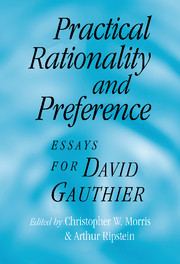Book contents
- Frontmatter
- Contents
- List of Contributors
- Practical Reason and Preference
- What Do Expressions of Preference Express?
- Preference
- Rational Temptation
- Bombs and Coconuts, or Rational Irrationality
- Are Intentions Reasons? And How Should We Cope with Incommensurable Values?
- Two Forms of Practical Generality
- Psychology for Cooperators
- Which Games Should Constrained Maximizers Play?
- The Strategy of Cooperation
- We Were Never in Paradise
Rational Temptation
Published online by Cambridge University Press: 11 January 2010
- Frontmatter
- Contents
- List of Contributors
- Practical Reason and Preference
- What Do Expressions of Preference Express?
- Preference
- Rational Temptation
- Bombs and Coconuts, or Rational Irrationality
- Are Intentions Reasons? And How Should We Cope with Incommensurable Values?
- Two Forms of Practical Generality
- Psychology for Cooperators
- Which Games Should Constrained Maximizers Play?
- The Strategy of Cooperation
- We Were Never in Paradise
Summary
“To characterize a person as rational is not to relate him to any order, or system, or framework, which would constrain his activities,” writes David Gauthier. Reason is free, he thinks, to develop its own path to any ends it takes as given. The suggestion appears in the earliest of Gauthier's essays in which he recognizes the freedom of reason from the strict constraints of maximization. And while Gauthier did not intend his words in this sense, he might have put his point about maximization in this form as well: To conceive of practical reason as subservient to a system of ends is to conceive its independence from any determinate path in the pursuit of those ends. The form of reasoning, as well as its content, must be instrumentally supplied. Gauthier's famous claim that instrumental reason sometimes demands the constraint of its own maximizing activity is thus dependent on the recognition of reason's freedom from constraint.
But to say that reason is free from constraint in this sense is to posit reason's constraint in another. Like many committed to understanding practical reason instrumentally, Gauthier accepts the economist's picture of the ends it is reason's purpose to pursue as established by the preferences of the agent whose ends they are. Reason's freedom, Gauthier thinks, is the freedom to serve the preferences of rational agents. Gauthier's recognition of reason's freedom from maximization thus depends on his willingness to accept the idea of reason's constraint, constraint by the preferences of the rational agents it serves.
- Type
- Chapter
- Information
- Practical Rationality and PreferenceEssays for David Gauthier, pp. 56 - 80Publisher: Cambridge University PressPrint publication year: 2001
- 3
- Cited by



